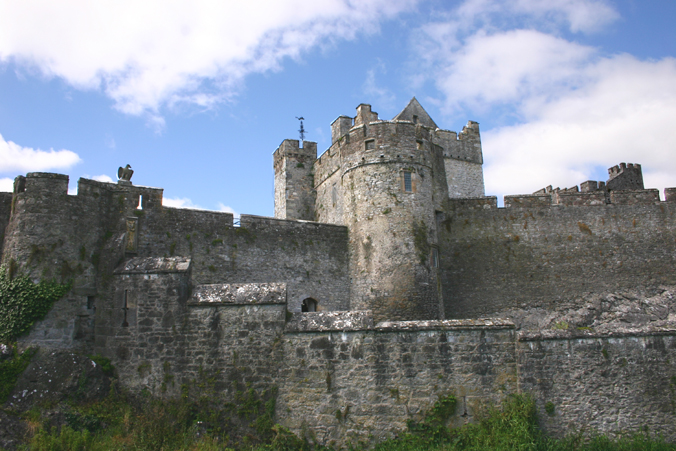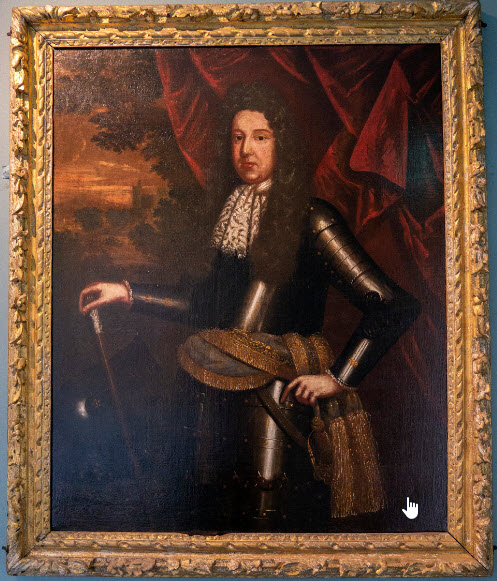After nearly three years fighting the English Parliamentary invaders, the Irish brigades (Tories) began to sue for peace in the early part of 1652. They had very little choice. Neither France nor Spain had come to Ireland’s defence, being more concerned with keeping diplomatic relations with the new English Commonwealth. Aid promised by the Duke of Lorraine had come too little and too late. The Irish brigades had committed themselves well, but the time had come to make terms with the enemy.
Rather than negotiate as a group, each Tory commander settled their own treaty with the English. As a result the terms varied, with some brigades winning more concessions than others.
Colonel John FitzPatrick
Colonel Fitzpatrick was active around Northern Tipperary and Westmeath and commanded a large brigade. He was the first to negotiate terms with the English after a disastrous winter. The English spent the early part of the season burning out the area that Sankey referred to as the “great bog of Monely” where they discovered the whereabouts of Fitzpatrick’s encampment. It’s unclear where this great bog was, but it’s my estimation that it may have been in the area of the Silvermine Mountains. [If anyone knows for certain, I would be very interested in learning where this great bog was.]
The English launched a full-scale attack, capturing most of Fitzpatrick’s food stores and burning what they could not carry away. The weather had betrayed the Irish, being unusually cold enough to have hard frosts settle and freezing up the bogs, a place where the brigades would often slip in to hide from the English. In a letter written by Colonel Jerome Sankey, Commander-in-Chief of the English Forces in Tipperary, he claims the English had killed 400 Irish soldiers, taken 350 prisoners, hundreds of cows, garrons and troop horses, including equipment, arms and ammunition. A crippling blow.
On March 7, 1652, Fitzpatrick signed Articles of Agreement at Streamstown, County Westmeath. According to historian Micheál Ó Siochru, the treaty granted a pardon to himself and his men (exempting any who were involved in the murder of Protestant settlers during the Irish Rebellion of 1641). The English granted him permission to transport his men to the Continent to serve as a mercenary force, provided they did not act against England. The final term, the only detail captured in A Contemporary History of Ireland from 1641 to 1652*, was for the protection of his estate, or the value thereof. (*Note: The other treaties were recorded in their entirety.)
Colonel Edmund O’Dwyer
The next to sign a treaty of surrender was Colonel Edmund O’Dwyer on March 23, 1652 at Cahir Castle. O’Dwyer was Commander-in-Chief of the Irish brigade in Tipperary and Waterford. To read more about Edmund O’Dwyer, check out this article.

O’Dwyer’s Articles of Agreement were extremely detailed and were outlined in a number of clauses. He agreed that on the tenth day of April, 1652, all the forces under his command would deliver up their arms and horses at Cashel, and in exchange, they should have protection for their lives and personal estates and the liberty to live in places that the English commander, Colonel Sankey, deemed them to live. Not terribly comforting, considering the broad land confiscations that occurred thereafter.
Similar to Fitzpatrick’s treaty, O’Dwyer had the right to transport his forces to the Continent, under the same restrictions. The English also applied what would become their standard clause, that anyone who had been involved in the Irish Rebellion of 1641 would be exempt from protection. Sadly, one of O’Dwyer’s colonels who signed the Articles of Agreement, a close kinsman named Donogh O’Dwyer, was later charged and convicted for his involvement in an attack and massacre at Cashel in 1642. He was hanged November 1652.
What struck me was how O’Dwyer ensured his men would not be left destitute. The agreement stated that the Horse “cavalry” were entitled to receive “competent satisfaction” for theirs, the value to be determined by four officers of each party, while commissioned officers could keep their possessions. And finally, every single man in the brigade was owed a month’s wages.
Those clauses alone solidified for me that O’Dwyer was a true leader, keeping his men’s best interests at heart.
Lord Muskerry
The rest of the brigades soon followed with agreements for surrender, but the last to reach terms with the English (June 22, 1652) was Donough MacCarthy, Viscount Muskerry, Commander-in-Chief of the forces in the province of Munster, commanding the area around Ross in County Kerry.
Muskerry was a vigorous negotiator and left nothing to chance, even naming the hour to which certain obligations were to take place. Being detail oriented, he was very specific about what (and how much) he and his men could keep, with himself being able to keep retain his horses and five cases of pistols. The terms also stipulated that he and his men should have “pardon for life” and he would have the liberty to transport five thousand men to serve as a mercenary army.
Similar to O’Dwyer’s treaty, Muskerry obtained wages for his men, only in his case, he won three months of wages. Having received satisfactory terms for his men, Muskerry pressed for the protection of his estates, including a provision that if they were ever to be under custodianship, he would still receive the rents and profits.
It could be that Muskerry insisted on more detailed provisions, having the benefit of being the last to sign a treaty with the English, and yet, that would have put him at a disadvantage. What we see here is evidence of a sharp and analytical mind.
In the end, the treaties did not protect, perhaps, as the Irish had expected. The English proved vigorous in their persecution of anyone believed to be involved in the massacre of Protestant settlers in 1641. In August 1652, the English enacted the Act of Settlement which resulted in wide-scale land seizures and relocation of the Irish to lands west of the Shannon in Connacht.
The saying “To Hell or Connacht” has always been attributed to Oliver Cromwell, but whether he did or did not actually utter those famous words, English Commonwealth policy for Ireland took far more than it ever conceded.
My third novel, Rebel’s Knot, explores the Irish resistance to the English through an Irish soldier and a young woman who survived an attack by English marauders. Available through online retailers.



“In the end, the treaties did not protect, perhaps, as the Irish had expected. The English proved vigorous in their persecution of anyone believed to be involved in the massacre of Protestant settlers in 1641.”
I may have missed your point in the copy, but I didn’t read any of the settlements as refering to the local Irish populations in general, just the brigades involved. A wider interpretation would have been impossibly expensive. The English had been traumatized by reports of tens of thousands of men, women and children murdered in 1641 on their plantations, and retribution was one of the main motivations behind Cromwell’s exercise.
You called Cromwell’s expedition “an invasion”. Since the days of Queen Elizabeth a century before, England and Wales had been trying to incorporate Ireland and Scotland into what we now think of as Great Britain. To our sensibilities, they had a losing formula for achieving this: all stick and the occasional sliver of moldy old carrot. That said, you can’t invade your own country. The Irish may never have accepted their defeats, but the island was an English dependency. Their repeated rebellions made Ireland the natural launching pad for Catholic invasions of England by the French and Spanish (and later Hitler), and homegrown Catholic troublemakers were launched and supported from there for decades, generations, centuries. It was Cromwell’s turn to administer the whipping.
So I really question your implied expectation of the Irish population for protection. At best, they hoped for mercy.
And someone needed to tell Cromwell when to stop, and there was no one invested in doing that. Parliament was fighting the Dutch and ending the War of the Three Kingdoms (First Civil War). So he made sure they wouldn’t rebel again for a long time.
Anyways, that’s my take.
LikeLiked by 1 person
Thanks for reading and for leaving a comment. For this post, I was indeed focused on the brigades and not the civilian populations. When the commanders signed the treaties, which included the exclusion for anyone involved in the 1641 massacres, I’m not sure they truly understood the depth of English resolve for retribution. Donogh O’Dwyer was one of the signatories of the Tipperary/Waterford treaty and six months later found himself arrested, tried and hanged for the hundred or so murders that occurred at Cashel in 1641. Was he only indirectly involved and thought the clause didn’t apply to him, or did he believe that the English wouldn’t bother persecuting him is unclear.
The conquest of Ireland can only be understood in relation to the rebellion of 1641, and Cromwell was especially determined to make the Irish pay. It’s a complex history (and yes, there were invasions before). I did write a post about the background of this conflict. I’m sure I didn’t do it justice, but I did attempt to provide a general overview. Here’s the link if you’re interested: https://cryssabazos.com/2021/12/22/the-irish-resistance-against-the-cromwellian-invasion/
LikeLike
Its hard to go back in time and understand the thought process of the typical Irish person in 1641. But, it seems likely that the Irish generally viewed the English monarch as a very distant force. Particularly in the west of Ireland, the Irish still retained the same lives they had lived for generations. Commerce still occurred as it always had. The king’s write held limited sway in Ulster or Connaught. Certainly, the Irish of 1641 who lived away from Dublin viewed Cromwell’s coming as an “invasion.”
Tom
LikeLiked by 1 person
Cryssa, I am making you my official historian. Thank you for these wonderful prieces.
LikeLiked by 1 person
Thank you for reading 🙂
LikeLike
Fascinating! So much I didn’t know about this era:)
LikeLiked by 1 person
Thank you! It is a fascinating chapter of Irish history
LikeLike